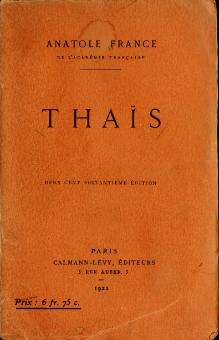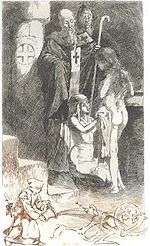Thaïs (novel)
 | |
| Author | Anatole France |
|---|---|
Publication date | 1890 |
| Pages | 350 |

Thaïs is a novel by French writer Anatole France, published in 1890. It is based on events in the life of Saint Thaïs of Egypt, a legendary convert to Christianity who is said to have lived in the 4th century.[1] It was the inspiration for the opera of the same name by Jules Massenet.
Summary
Paphnuce, an ascetic hermit of the Egyptian desert, journeys to Alexandria to find Thais, the libertine beauty whom he knew as a youth. Masquerading as a dandy, he is able to speak with her about eternity; surprisingly he succeeds in converting her to Christianity. Yet on their return to the desert he becomes fascinated with her former life. She enters a convent to repent of her sins. He cannot forget the pull of her famous beauty, and becomes confused about the values of life. Later, as she is dying and can only see heaven opening before her, he comes to her side and tells her that her faith is an illusion, and that he loves her.[2]
Adaptations
The novel was adapted in 1917 for an American silent film, Thais.
The Indian writer Munshi Premchand adapted Thaïs as Alankar in Hindi language.[3]
References
- ↑ Acta SS., IV, Oct., 223; Bibl. Hag.lat., II, 1161
- ↑ Anatole France, Thais (Paris 1890, revised edition 1921); translated into English: Modern Library 1926; Univ.of Chicago 1976.
- ↑ Barbara Stoler Miller (1994). Masterworks of Asian literature in comparative perspective: a guide for teaching. M.E. Sharpe. p. 169. ISBN 978-1-56324-258-8.
External links
| Wikimedia Commons has media related to Thaïs (novel). |
- Thaïs available at Project Gutenberg
- Thais By Anatole France, Urdu Translation
-
 Thais public domain audiobook at LibriVox
Thais public domain audiobook at LibriVox